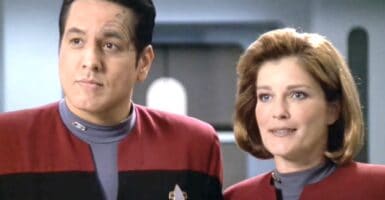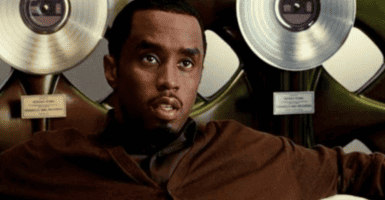Star Trek Voyager Imitates The Original Series In One Crucial Way
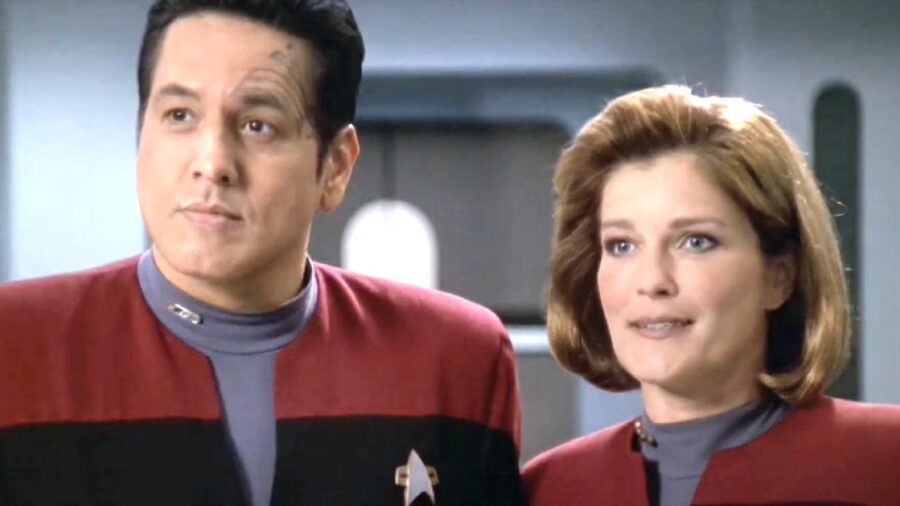
For the most part, Star Trek: Voyager did its own thing as a series–unlike other Trek shows at the time, it featured a female captain, it stranded the ship on the other side of the galaxy, and it made half the crew reformed terrorists. However, this fresh new show imitated The Original Series in one crucial way that ultimately helped make it so successful. Early Trek’s success was built around a trinity of Kirk, Spock, and McCoy, and as showrunner Michael Piller argued, early Voyager’s success was built around a trinity of Janeway, Chakotay, and B’Elanna Torres.
Kirk, Spock, And McCoy
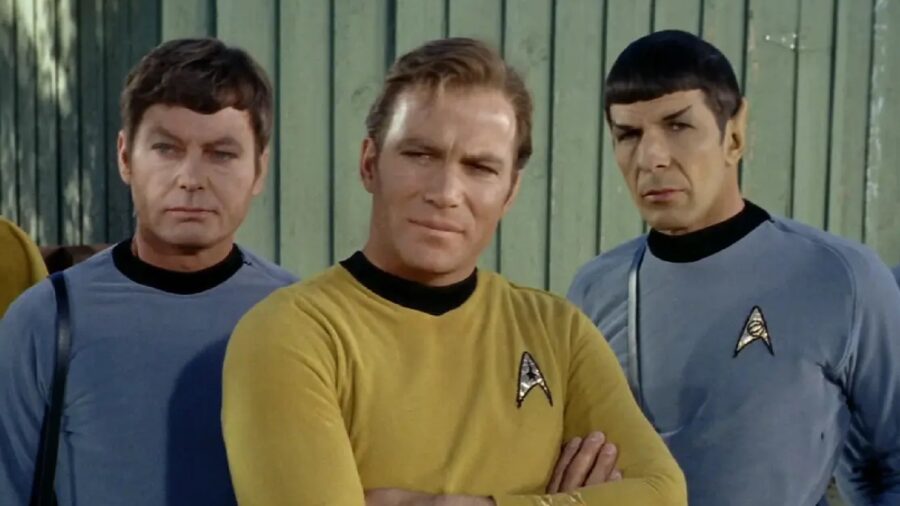
Piller made an interesting comment regarding the script development of “Parallax,” the first post-pilot episode of Star Trek: Voyager. “Ultimately, what worked was the triangle between Chakotay, Janeway and B’Elanna,” he said. “The more time we spent with that, the better the show became.”
When I recently discovered this quote, I couldn’t help but compare this “triangle” on Voyager to the triangle of The Original Series. Many fans jokingly refer to Kirk, Spock, and McCoy as the “Holy Trinity,” but it’s more useful to think of them using terminology determined by Sigmund Freud.
According to Freud, any person’s mind can be divided into three sections: the highly emotional id, the ultra-rational superego, and the ego whose job is to mediate the input of the other two and ultimately make the best decisions.
Star Trek’s First Id, Ego, And Superego
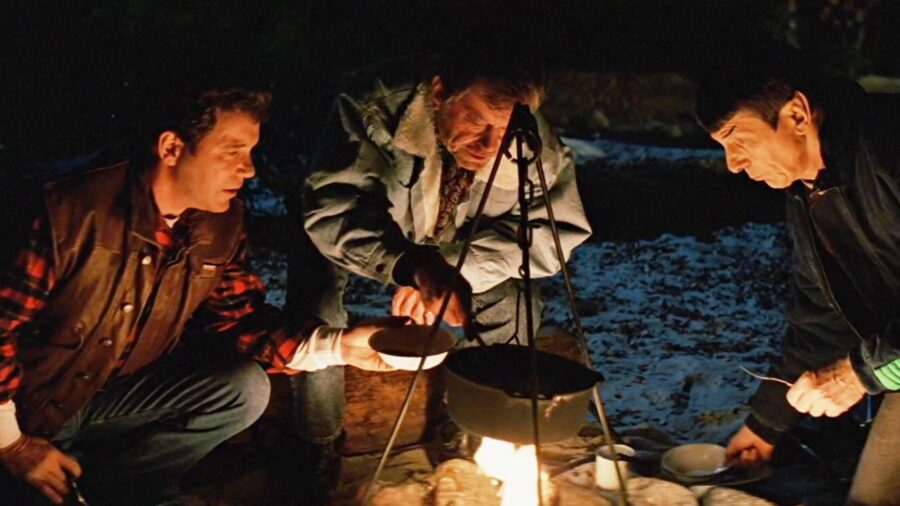
What does Sigmund Freud have to do with Star Trek: Voyager, aside from Janeway dropping his name that one time? In this case, Piller’s quote about the newer show can best be understood by comparing it to the original one.
In The Original Series, the emotional McCoy was the id, the super-logical Spock was the superego, and Kirk was the ego–something frequently dramatized by the fact that he would take very different suggestions from the other two before deciding on a course of action.
Voyager’s Own Id, Ego, And Superego

Back then, Piller didn’t name-drop either Freud or The Original Series, but I think he was subconsciously realizing that the newer show had the beginnings of the Freudian dynamic that made the adventures of Kirk and his crew so memorable. I
n Star Trek: Voyager, the angry and emotional half-Klingon B’Elanna Torres is most definitely the id, and Chakotay (what with his constant parables, Native American and otherwise, about what to do in any given situation) functions as the superego.
Captain Janeway, like Kirk before her, often gets input from these two before deciding on what to do. Each decision she makes has unimaginable stakes because her ship, unlike the Enterprise, has to operate without any Starfleet or Federation support.
A New Superego
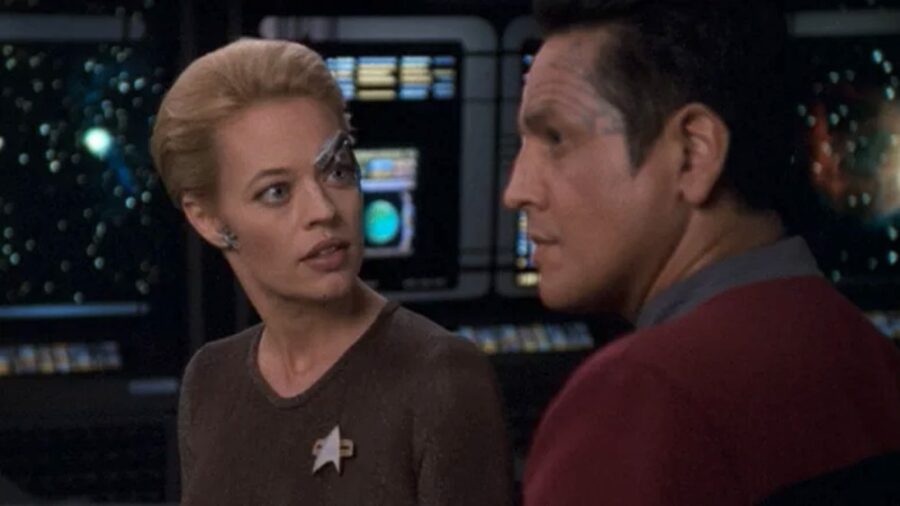
Interestingly, Star Trek: Voyager evolved over time, as did the triangle. The introduction of the former Borg Seven of Nine soon made her into the superego of the ship, effectively supplanting Chakotay.
This worked out for the best– Piller’s successor Brannon Braga accused actor Robert Beltran of phoning in his performance and admitted this caused the writers to stop catering to his character, so Jeri Ryan’s Seven of Nine was a solid replacement.
Janeway and Torres remain the ego and id, respectively, and their relationship only gets closer over time. In fact, the ep “Barge of the Dead” has a heartwarming reveal that Torres sees the captain as a mother figure that she hopes to make proud.
Freud In Media

Bottom line: I think Piller was right on the money about Star Trek: Voyager getting better when it focused on a triangle of characters, and the show improved even more when it replaced Chakotay with the (infinitely better-written) Seven of Nine.
Incidentally, Freud’s theory runs rampant throughout TV and movies, as seen by other genre triangles in the Harry Potter films and even The Dark Knight. As a franchise, Star Trek didn’t invent this onscreen formula, but the sheer popularity and ongoing cultural impact of Voyager reveals that this show may very well have perfected it.









